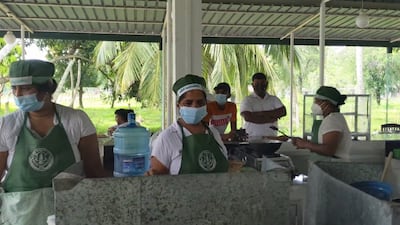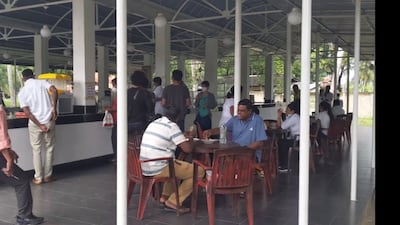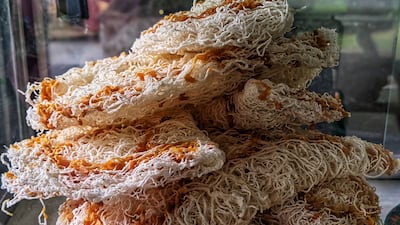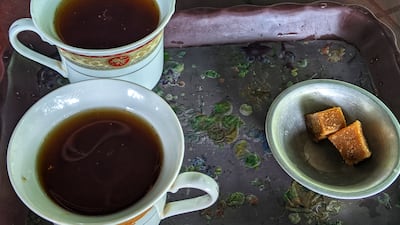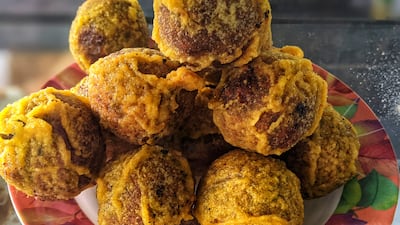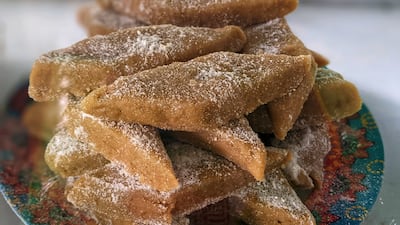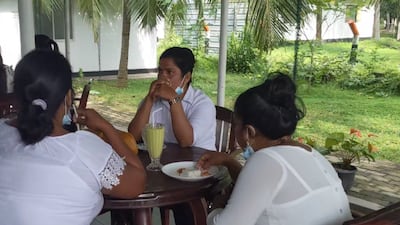With an enthusiastic smile, Dilshani KM, a gregarious Sinhalese woman dressed in an embroidered white top and skirt, quickly takes charge of her workstation. But not before donning her signature green apron, disposable transparent gloves and a mask.
“I have an order for kothu roti,” Dilshani, 36, says as she rapidly gathers the ingredients to prepare one of the most popular Sri Lankan delicacies, which is a combination of skill, taste and texture.
Dilshani heats up a hot flat pan while chopping the roti into small strips. She then tosses the strips with spices and an assortment of diced vegetables in a generous helping of oil, and wallops away with a pair of machete-style knives. Just a few minutes later, she serves the piping-hot kothu roti, topped with slit green chillies and finely sliced onion, to her customer.
Welcome to Hela Bojun Hala, an open-kitchen eatery in the lush Central Highlands of Sri Lanka. Here, local women (we counted nine on our visit) — all attired in green aprons and caps — dish up, in a jiffy, various delicacies from their own workstations. Others are occupied taking orders from customers, who swarm through the door from morning to evening.
Of the many big and small food outlets near by, only Hela Bojun Hala remains busy throughout the day.
What makes Hela Bojun Hala special?
Hela Bojun Hala, which translates to “traditional food courts” from the Sinhala, are a chain of local, women-led food outlets operating across Sri Lanka, under the tagline of “true Sri Lankan taste”. The eateries are established and administered by the Ministry of Agriculture and the provincial agricultural departments, to align with the United Nations project on biodiversity for food and nutrition.
The initiative recruits local women who are well versed in cooking, and trains them in hospitality and entrepreneurship, with a strong emphasis on cleanliness and hygiene. Subsequently, they are supplemented with financial assistance if needed, to set up workstations inside a Hela Bojun Hala.
I sold home-made snacks for 10 years ... but Hela Bojun Hala has been a blessing to me
Dilshani KM,
vendor, Hela Bojun Hala, Kandy
Since the opening in 2006 of the first Hela Bojun Hala outlet in Kandy, a hill town in the Central Province, the initiative has trained 750 women entrepreneurs, with 22 outlets operating in urban areas.
At the centre where Dilshani works, 36 women work a six-hour shift so the opportunity to earn is equally distributed. The purpose of these ventures is, after all, women's empowerment.
The introduction of traditional food courts is one of the island’s major initiatives to fulfil a two-pronged objective: encouraging agriculture-based women entrepreneurship and reviving the present generation’s interest in indigenous Sri Lankan produce.
In an attempt to achieve the latter objective, the outlets encourage consumption of nutritious local food and snacks that are rich in indigenous millets, as well as fruits, cereals and jaggery. As such, the initiative also helps to turn around poor dietary habits among many Sri Lankans.
Ammachi Unavagam to the rescue
In the towns and cities of the once war-torn northern province Jaffna, Ammachi Unavagam or “grandma’s kitchen” from the Tamil, replace the Hela Bojun outlets of southern Sri Lanka, and serve authentic, nutrient-rich Tamil food to cater to the local population.
“We prepare everything with local ingredients,” says Lakshmi, who works at Ammachi Unavagam in Keerimalai, a pilgrimage centre on the outskirts of Jaffna. “Parippu vadai [lentil fritters] is the most popular snack here.”
The first Ammachi Unavagam outlet opened in 2017, to provide livelihood to war widows and other women whose lives had been disrupted by the 33-year civil war in Sri Lanka.
Even during the island nation’s recent food crisis, Hela Bojun Hala and Ammachi Unavagam centres were a boon for low-income groups and travellers alike, because they provided meals at affordable rates.
Bread and butter
“They serve fresh and tasty local food,” says Yasantha, who frequents the roadside Hela Bojun Hala where Dilshani works to buy pani-walalu (a Sri Lankan take on the coiled orange Indian sweetmeat jalebi) and aasmi (deep-fried rice flour and coconut milk) for his family, who live on the outskirts of Kandy.
Dilshani is one of the few remaining Sinhala women who still prepare traditional Sri Lankan delicacies, including aasmi and kola kenda, an ancient herbal porridge and drink.
“I sold home-made snacks for 10 years before I started working at this eatery two years ago, but Hela Bojun Hala has been a blessing to me,” she says while handing over half a dozen aasmi and pani-walalu to Yasantha.
Apart from financial independence, working here has helped entrepreneurs like Dilshani foster a sisterhood with their co-workers as well as to nurture a loyal customer base beyond the confines of the eatery.
Dilshani now sells her home-made snacks and beverages through Facebook, and takes orders over the phone. And while a few hundred Sri Lankan rupees go towards paying electricity and subsidised rent to the Ministry of Agriculture, the remaining amount is her profit, an income that, she says, “runs my family”.
Specs
Engine: Dual-motor all-wheel-drive electric
Range: Up to 610km
Power: 905hp
Torque: 985Nm
Price: From Dh439,000
Available: Now
The specs
AT4 Ultimate, as tested
Engine: 6.2-litre V8
Power: 420hp
Torque: 623Nm
Transmission: 10-speed automatic
Price: From Dh330,800 (Elevation: Dh236,400; AT4: Dh286,800; Denali: Dh345,800)
On sale: Now
Killing of Qassem Suleimani
The burning issue
The internal combustion engine is facing a watershed moment – major manufacturer Volvo is to stop producing petroleum-powered vehicles by 2021 and countries in Europe, including the UK, have vowed to ban their sale before 2040. The National takes a look at the story of one of the most successful technologies of the last 100 years and how it has impacted life in the UAE.
Read part four: an affection for classic cars lives on
Read part three: the age of the electric vehicle begins
Read part one: how cars came to the UAE
LA LIGA FIXTURES
Friday
Granada v Real Betis (9.30pm)
Valencia v Levante (midnight)
Saturday
Espanyol v Alaves (4pm)
Celta Vigo v Villarreal (7pm)
Leganes v Real Valladolid (9.30pm)
Mallorca v Barcelona (midnight)
Sunday
Atletic Bilbao v Atletico Madrid (4pm)
Real Madrid v Eibar (9.30pm)
Real Sociedad v Osasuna (midnight)
Tightening the screw on rogue recruiters
The UAE overhauled the procedure to recruit housemaids and domestic workers with a law in 2017 to protect low-income labour from being exploited.
Only recruitment companies authorised by the government are permitted as part of Tadbeer, a network of labour ministry-regulated centres.
A contract must be drawn up for domestic workers, the wages and job offer clearly stating the nature of work.
The contract stating the wages, work entailed and accommodation must be sent to the employee in their home country before they depart for the UAE.
The contract will be signed by the employer and employee when the domestic worker arrives in the UAE.
Only recruitment agencies registered with the ministry can undertake recruitment and employment applications for domestic workers.
Penalties for illegal recruitment in the UAE include fines of up to Dh100,000 and imprisonment
But agents not authorised by the government sidestep the law by illegally getting women into the country on visit visas.
Ferrari 12Cilindri specs
Engine: naturally aspirated 6.5-liter V12
Power: 819hp
Torque: 678Nm at 7,250rpm
Price: From Dh1,700,000
Available: Now
Email sent to Uber team from chief executive Dara Khosrowshahi
From: Dara
To: Team@
Date: March 25, 2019 at 11:45pm PT
Subj: Accelerating in the Middle East
Five years ago, Uber launched in the Middle East. It was the start of an incredible journey, with millions of riders and drivers finding new ways to move and work in a dynamic region that’s become so important to Uber. Now Pakistan is one of our fastest-growing markets in the world, women are driving with Uber across Saudi Arabia, and we chose Cairo to launch our first Uber Bus product late last year.
Today we are taking the next step in this journey—well, it’s more like a leap, and a big one: in a few minutes, we’ll announce that we’ve agreed to acquire Careem. Importantly, we intend to operate Careem independently, under the leadership of co-founder and current CEO Mudassir Sheikha. I’ve gotten to know both co-founders, Mudassir and Magnus Olsson, and what they have built is truly extraordinary. They are first-class entrepreneurs who share our platform vision and, like us, have launched a wide range of products—from digital payments to food delivery—to serve consumers.
I expect many of you will ask how we arrived at this structure, meaning allowing Careem to maintain an independent brand and operate separately. After careful consideration, we decided that this framework has the advantage of letting us build new products and try new ideas across not one, but two, strong brands, with strong operators within each. Over time, by integrating parts of our networks, we can operate more efficiently, achieve even lower wait times, expand new products like high-capacity vehicles and payments, and quicken the already remarkable pace of innovation in the region.
This acquisition is subject to regulatory approval in various countries, which we don’t expect before Q1 2020. Until then, nothing changes. And since both companies will continue to largely operate separately after the acquisition, very little will change in either teams’ day-to-day operations post-close. Today’s news is a testament to the incredible business our team has worked so hard to build.
It’s a great day for the Middle East, for the region’s thriving tech sector, for Careem, and for Uber.
Uber on,
Dara
UAE currency: the story behind the money in your pockets
Quick facts on cancer
- Cancer is the second-leading cause of death worldwide, after cardiovascular diseases
- About one in five men and one in six women will develop cancer in their lifetime
- By 2040, global cancer cases are on track to reach 30 million
- 70 per cent of cancer deaths occur in low and middle-income countries
- This rate is expected to increase to 75 per cent by 2030
- At least one third of common cancers are preventable
- Genetic mutations play a role in 5 per cent to 10 per cent of cancers
- Up to 3.7 million lives could be saved annually by implementing the right health
strategies
- The total annual economic cost of cancer is $1.16 trillion
UAE%20Warriors%2033%20Results
%3Cp%3E%3Cstrong%3EFeatherweight%20title%3C%2Fstrong%3E%3Cbr%3EAli%20Al%20Qaisi%20by%20Jesse%20Arnett%20by%20submission%2C%20round%203%3Cbr%3E%3Cstrong%3EWelterweight%20title%3C%2Fstrong%3E%3Cbr%3EJosh%20Togo%20bt%20Tahir%20Abdullaev%20by%20unanimous%20decision%3Cbr%3E%3Cstrong%3EFlyweight%3C%2Fstrong%3E%3Cbr%3EIago%20Ribeiro%20bt%20Juan%20Puerta%20by%20unanimous%20decision%3Cbr%3E%3Cstrong%3EMiddleweight%3C%2Fstrong%3E%3Cbr%3EYerkin%20Darmen%20bt%20Tyler%20Ray%20by%20TKO%2C%20round%203%3Cbr%3E%3Cstrong%3EWelterweight%3C%2Fstrong%3E%3Cbr%3EAbdulla%20Al%20Bousheiri%20bt%20John%20Adajar%20by%20submission%2C%20round%201%3Cbr%3E%3Cstrong%3ECatchweight%20232lb%3C%2Fstrong%3E%3Cbr%3EAsylzhan%20Bakhytzhanuly%20bt%20Hasan%20Yousefi%20by%20submission%2C%20round%202%3Cbr%3E%3Cstrong%3ECatchweight%20176lb%3C%2Fstrong%3E%3Cbr%3EAlin%20Chirila%20bt%20Silas%20Robson%20by%20KO%2C%20round%201%3Cbr%3E%3Cstrong%3ECatchweight%20176lb%3C%2Fstrong%3E%3Cbr%3EArvin%20Chan%20bt%20Abdi%20Farah%20by%20TKO%2C%20round%201%3Cbr%3E%3Cstrong%3ELightweight%3C%2Fstrong%3E%3Cbr%3EOle-Jorgen%20Johnsen%20bt%20Nart%20Abida%20by%20TKO%2C%20round%201%3Cbr%3E%3Cstrong%3EBantamweight%3C%2Fstrong%3E%3Cbr%3EOtar%20Tanzilov%20bt%20Eduardo%20Dinis%20by%20TKO%2C%20round%203%3Cbr%3E%3Cstrong%3EStrawweight%3C%2Fstrong%3E%3Cbr%3EColine%20Biron%20bt%20Aysun%20Erge%20via%20submission%2C%20round%202%3Cbr%3E%3Cstrong%3EWelterweight%3C%2Fstrong%3E%3Cbr%3ESoslan%20Margiev%20bt%20Mathieu%20Rakotondrazanany%20by%20unanimous%20decision%3Cbr%3E%3Cstrong%3EBantamweight%3C%2Fstrong%3E%3Cbr%3EBakhromjon%20Ruziev%20bt%20Younes%20Chemali%20by%20majority%20decision%3C%2Fp%3E%0A
Results:
6.30pm: Mazrat Al Ruwayah (PA) | Group 2 | US$55,000 (Dirt) | 1,600 metres
Winner: AF Al Sajanjle, Tadhg O’Shea (jockey), Ernst Oertel (trainer)
7.05pm: Meydan Sprint (TB) | Group 2 | $250,000 (Turf) | 1,000m
Winner: Blue Point, William Buick, Charlie Appleby
7.40pm: Firebreak Stakes | Group 3 | $200,000 (D) | 1,600m
Winner: Muntazah, Jim Crowley, Doug Watson
8.15pm: Meydan Trophy Conditions (TB) | $100,000 (T) | 1,900m
Winner: Art Du Val, William Buick, Charlie Appleby
8.50pm: Balanchine Group 2 (TB) | $250,000 (T) | 1,800m
Winner: Poetic Charm, William Buick, Charlie Appleby
9.25pm: Handicap (TB) | $135,000 (D) | 1,200m
Winner: Lava Spin, Richard Mullen, Satish Seemar
10pm: Handicap (TB) | $175,000 (T) | 2,410m
Winner: Mountain Hunter, Christophe Soumillon, Saeed bin Suroor
The biog
Age: 23
Occupation: Founder of the Studio, formerly an analyst at Cleveland Clinic Abu Dhabi
Education: Bachelor of science in industrial engineering
Favourite hobby: playing the piano
Favourite quote: "There is a key to every door and a dawn to every dark night"
Family: Married and with a daughter
Europe’s rearming plan
- Suspend strict budget rules to allow member countries to step up defence spending
- Create new "instrument" providing €150 billion of loans to member countries for defence investment
- Use the existing EU budget to direct more funds towards defence-related investment
- Engage the bloc's European Investment Bank to drop limits on lending to defence firms
- Create a savings and investments union to help companies access capital
Our family matters legal consultant
Name: Hassan Mohsen Elhais
Position: legal consultant with Al Rowaad Advocates and Legal Consultants.
Abandon
Sangeeta Bandyopadhyay
Translated by Arunava Sinha
Tilted Axis Press
Ten10 Cricket League
Venue and schedule Sharjah Cricket Stadium, December 14 to 17
Teams
Maratha Arabians Leading player: Virender Sehwag; Top picks: Mohammed Amir, Imad Wasim; UAE players: Shaiman Anwar, Zahoor Khan
Bengal Lions Leading player: Sarfraz Ahmed; Top picks: Sunil Narine, Mustafizur Rahman; UAE players: Mohammed Naveed, Rameez Shahzad
Kerala Kings Leading player: Eoin Morgan; Top picks: Kieron Pollard, Sohail Tanvir; UAE players: Rohan Mustafa, Imran Haider
Pakhtoons Leading player: Shahid Afridi; Top picks: Fakhar Zaman, Tamim Iqbal; UAE players: Amjad Javed, Saqlain Haider
Punjabi Legends Leading player: Shoaib Malik; Top picks: Hasan Ali, Chris Jordan; UAE players: Ghulam Shabber, Shareef Asadullah
Team Sri Lanka Cricket Will be made up of Colombo players who won island’s domestic limited-overs competition
Titanium Escrow profile
Started: December 2016
Founder: Ibrahim Kamalmaz
Based: UAE
Sector: Finance / legal
Size: 3 employees, pre-revenue
Stage: Early stage
Investors: Founder's friends and Family
'Gold'
Director:Anthony Hayes
Stars:Zaf Efron, Anthony Hayes
Rating:3/5
Red flags
- Promises of high, fixed or 'guaranteed' returns.
- Unregulated structured products or complex investments often used to bypass traditional safeguards.
- Lack of clear information, vague language, no access to audited financials.
- Overseas companies targeting investors in other jurisdictions - this can make legal recovery difficult.
- Hard-selling tactics - creating urgency, offering 'exclusive' deals.
Courtesy: Carol Glynn, founder of Conscious Finance Coaching
<html><head><meta http-equiv="Content-Type" content="text/html" charset="UTF-8" /></head><body><!--PSTYLE=* Labels%3aFH Label 18 Sport--><p>Beach soccer</p><!--PSTYLE=BY Byline--><p>Amith Passela</p><p /></body></html>
Meydan race card
6.30pm: Maiden; Dh165,000; (Dirt) 1,200m
7.05pm: Handicap; Dh170,000; (D) 1,200m
7.40pm: Maiden; Dh165,000; (D) 1,900m
8.15pm: Handicap; Dh185,000; (D) 2,000m
8.50pm: Handicap; Dh185,000; (D) 1,600m
9.25pm: Handicap; Dh165,000; (D) 2,000m
Our family matters legal consultant
Name: Hassan Mohsen Elhais
Position: legal consultant with Al Rowaad Advocates and Legal Consultants.
Why are asylum seekers being housed in hotels?
The number of asylum applications in the UK has reached a new record high, driven by those illegally entering the country in small boats crossing the English Channel.
A total of 111,084 people applied for asylum in the UK in the year to June 2025, the highest number for any 12-month period since current records began in 2001.
Asylum seekers and their families can be housed in temporary accommodation while their claim is assessed.
The Home Office provides the accommodation, meaning asylum seekers cannot choose where they live.
When there is not enough housing, the Home Office can move people to hotels or large sites like former military bases.
CONCRETE COWBOY
Directed by: Ricky Staub
Starring: Idris Elba, Caleb McLaughlin, Jharrel Jerome
3.5/5 stars
The specs
Engine: 2.0-litre 4-cylinder turbo
Power: 240hp at 5,500rpm
Torque: 390Nm at 3,000rpm
Transmission: eight-speed auto
Price: from Dh122,745
On sale: now



